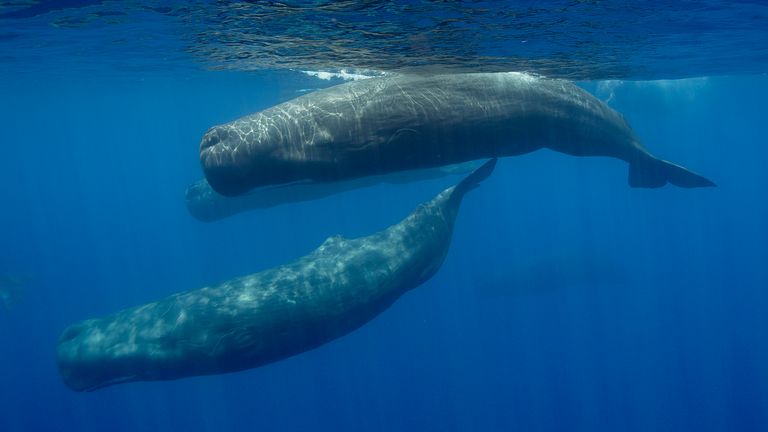Scientists using artificial intelligence to decode the sounds made by sperm whales believe their calls are so complex they are similar to human language.
New research by a group of experts studying a clan of whales in the East Caribbean found they use a ‘morse code’ of clicks, with the rhythm and tempo adding extra layers of complexity to convey meaning.
The calls are so rich in information that they are likely to help pods make group decisions and coordinate joint tasks, such as foraging for food and rearing young, according to the scientists on the long-term study, called Project Ceti.
Dr. David Gruber, founder and lead of Project CETI said: “This discovery marks a profound moment in advancing our understanding of sperm whales.
“It opens up the possibility that sperm whales have an incredibly complex and nuanced communication system -and inspires us to continue on our whale listening journey.”
Research by the team has previously shown the whales signal their clan identity with two evenly spaced clicks followed by three in quick succession.
But the new study, published in the journal Nature Communications, takes the understanding of whale language to a new level.
The researchers analysed recordings of around 60 individuals from the Dominica Sperm Whale Project.
They found that as well as the sequence of clicks, called a coda, whales would vary the tempo and rhythm depending on the context of their conversation.
They would also add an extra click at the end of some codas and gently vary the duration of repeated sequences.
The scientists identified 143 regularly used combinations of all the variables that they believe form a ‘sperm whale phonetic alphabet’.
The researchers say they are still a long way from understanding the whales.
But they add: “While the communicative function of many codas remains an open question, our results show that the sperm whale communication system is, in principle, capable of representing a large space of possible meanings, using similar mechanisms to those employed by human sound production and representation systems (e.g., speech, text, Morse code, and musical notation).”
Sperm whales have the largest brain of any creature known to have lived on the planet.
Females and young males hang out in highly social pods of up to 50 individuals, diving around a mile into the dark ocean depths to hunt for giant squid.
Scientists on Project CETI (the Cetacean Translation Initiative) are using robotic vessels to follow pods, recording their communication and behaviour.
Artificial intelligence is then being used to look for vocalisations that are related to what the whales are doing.
Jacob Andreas, who is part of the Project CETI machine learning team, said: “This paper shows that sperm whale communication has some of the same structural features as the most sophisticated communication systems in the animal kingdom.
“We’re excited to start studying how it’s used to convey meaning.”
The Project CETI research has shown that when whales are born they babble, just like human babies, and take a while to learn to communicate.
Scientists believe artificial intelligence will one day help them learn to communicate with the whales in the same way. If successful it would be the first time humans have spoken with another species.



























